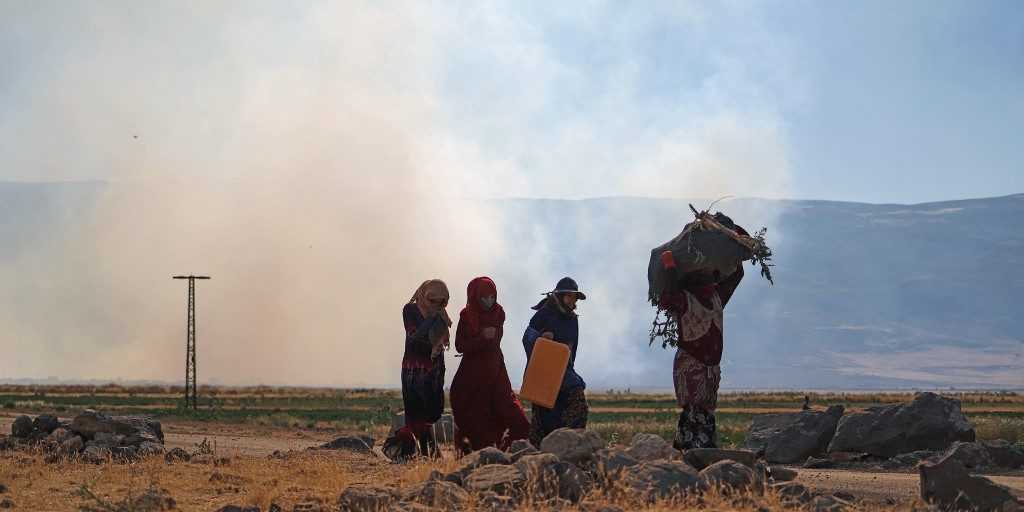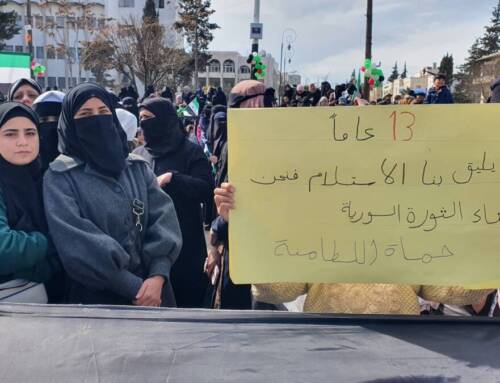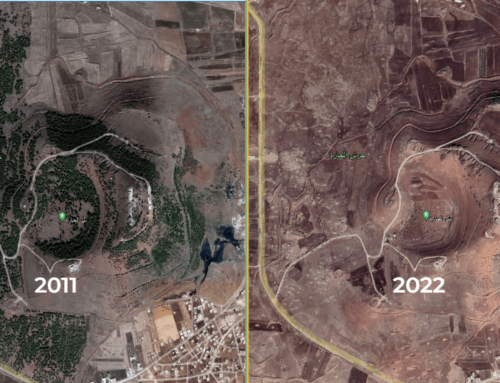Sowing fear, burning crops: The latest regime offensive terrorizes farmers in northwest Syria
The latest regime strikes on northwest Syria have claimed lives and disrupted the harvest, pushing farmers underground to escape indiscriminate bombings and the illegal targeting of agricultural areas.
16 June 2021
AMMAN — Over the past two weeks, pro-Assad forces have bombed over a dozen locations in the southern countryside of Idlib province, amid deafening silence from the international community. On June 10, eleven people were killed, including a child, by artillery shelling against the town of Ibileen.
The latest regime strikes against northwest Syria have sparked new displacement and aroused fears of a new military offensive on the last opposition-held territory. The campaign has also disrupted the harvest season in critical agricultural areas, serving the regime’s strategy to starve the region.
Regular bombings
“Bombing did not stop in Idlib despite the ceasefire agreement [between Russia and Turkey in March 2020],” Ahmad Sheikho, Media officer at the Syrian Civil Defense (also known as the White Helmets), told Syria Direct.
Since the beginning of this year, the Civil Defense teams “responded to more than 582 direct attacks on civilians in northwest Syria, launched by the regime forces, Russia and their militias, in addition to the [Kurdish-dominated] Syrian Democratic Forces. The teams worked to retrieve the bodies of 90 people who were killed as a result of these attacks, including 16 children,” Sheikho added.
The strikes are first and foremost a show of force ahead of important diplomatic talks on the fate of the territory.
Demoralizing and unceasing, the strikes are regular reminders of the looming threat of a new offensive on northwest Syria, where around four million people – including two million internally displaced persons (IDPs) – live trapped in a shrinking opposition-held enclave controlled by Hayat Tahrir al-Sham (HTS), an Islamist armed group designated as a terrorist organization by the US and UN.
Each bombing campaign provokes new displacement and reawakens fear of a military offensive on the province. “It is a military escalation [aiming to displace] people from their cities and villages,” Fared al-Mahlool, a photojournalist living in Idlib, told Syria Direct. He fears the latest round of escalation will turn into a full-blown military operation to seize territory.
The towns targeted during the latest flare-up lie south of the M4 highway that connects the regime-held port of Latakia to the industrial city of Aleppo, a strategic corridor long eyed by the regime. But for most analysts, the strikes are first and foremost a show of force ahead of important diplomatic talks on the fate of the territory.
On July 10, UN resolution 2533 authorizing the delivery of aid to northwest Syria from across the border with Turkey will expire. A lifeline to millions, this cross-border aid mechanism comes under increased pressure each year at the UN Security Council from Russia, which seeks to reduce or terminate cross-border aid flows.
“As a general rule, the Russians and the Assad regime escalate airstrikes on Idlib before the U.N. Security Council deliberations on cross-border aid into Syria as a means to signal to the international community that Assad, and not his foreign enemies, will determine the fate of his country,” Nicholas Heras, Senior Analyst for the Washington-based Newlines Institute, told Syria Direct.
In parallel, “there have been a few recent targeted strikes by the Russians reportedly against senior HTS officials that work with international media and as de facto envoys to the international community,” Heras added. Among those killed in the June 10 airstrikes were Abu Khalid al-Shami, the military spokesperson of HTS, and Abu Musab al-Homsi, the group’s media coordinator.
HTS has been courting Western audiences in a bid to gain acceptability vis-à-vis Western actors, hoping to shed its terrorist designation in the long run.
“These strikes against HTS’s liaisons to the outside world reflect Russia’s growing discomfort with what it views as the West’s dangerous normalization of HTS,” Heras added. “The last thing Russia wants is HTS becoming an acceptable local Syrian actor that cuts deals with Europe and potentially even the United States.”
Harvesting under the bombs
The latest escalation coincides with the harvest season in the southern countryside of Idlib – during which farmers typically return to the area to tend to their crops.
Racing to harvest their crops in fear that they will be destroyed, farmers have resorted to tending their fields at night and traveling on foot to avoid detection by regime forces.
“It is impossible to live, cultivate and harvest in the area under this indiscriminate bombing,” Musab al-Ashkr, a journalist and farmer, told Syria Direct. Along with the southern countryside of Idlib, the opposition-held areas of al-Ghab plain in the western countryside of Hama have also been targeted by regime strikes, which caused significant damage to the crops and agricultural infrastructure.
According to the economic publication Syria Report, several fires broke out between May 29 and June 7 as a result of the bombings, which destroyed 35 hectares of wheat and killed several farmers.
Such fires are a recurring feature of the summer months in northern Syria. Many are sparked accidentally, particularly in the overcrowded informal camps set up in or near orchards, forests and fields. However, “over the last couple of years, using both satellite imagery and open-source reporting, we have witnessed a trend of upticks in wildfires in the border area between the regime and rebel-held areas during springtime around the harvest season,” Wim Zwijnenburg, a Project Leader focusing on conflict and environment-related issues at the NGO PAX, told Syria Direct.
Documented use of incendiary weapons against fields suggests that some of the fires are sparked deliberately, as seems to be the case in al-Ghab plain. “The picture on the ground is complex, but overall, the link between the use of weapons and fires on the frontline is clear, looking at the map and comparing it with satellite imagery,” Zwijnenburg added.
Long-term consequences
Agriculture is protected by international law under Article 55 of the Protocol Additional to the Geneva Conventions, which prohibits “the use of methods or means of warfare which are intended or may be expected to cause such damage to the natural environment.”
Yet attacks against agricultural areas routinely take place in Syria, along with other violations of the laws of war, such as the systematic targeting of hospitals and bakeries.
In addition to the immediate threat to farmers’ lives and livelihoods, “in the long-term, unexploded ordnance poses additional risks to farmers [who can no longer] use the land if it is contaminated,” Zwijnenburg noted. “Damage to irrigation systems will have long-term impacts on farmers’ ability to use agricultural land. In some areas, this can contribute to desertification if land is abandoned.”
The beginning of June is the harvest season of staple food grown in al-Ghab, such as wheat, lentils and barley. Racing to harvest their crops in fear that they will be destroyed, farmers have resorted to tending their fields at night and traveling on foot to avoid detection by regime forces.
“All of this, for the sake of getting food, even if it is under bombardment and death – there is no way for farmers to survive other than their fields,” al-Ashkr lamented.







